#python rossum
Explore tagged Tumblr posts
Note
do you have any homestuck ocs?
i do i just never post abt them or any kind of oc shit tbh cuz no one rlly gives a fuck LOL

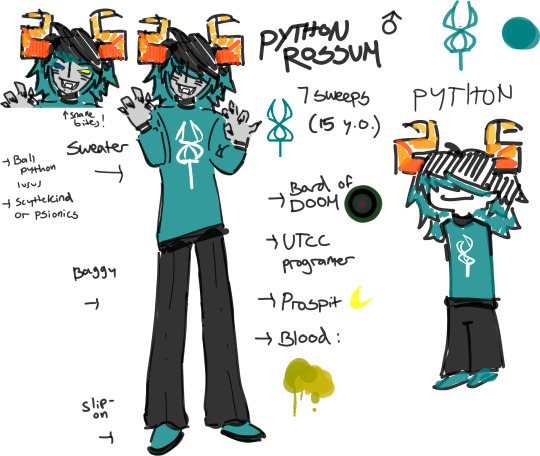
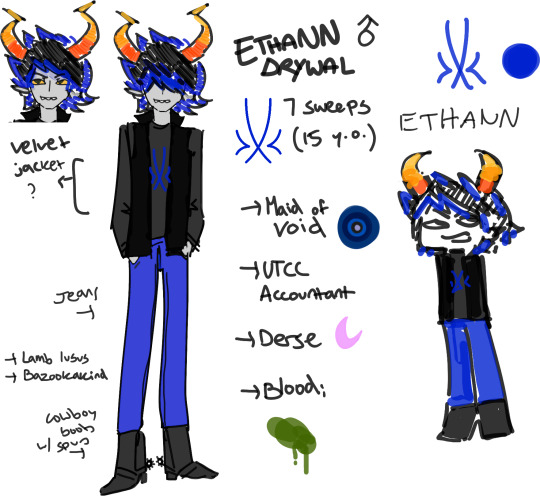

(ref was edited im just lazy. scotch uses umbrellakind) here's the trolls. they're all LIARS nd schoolfeed schoolfriends and run this shitty underground lowblood society called the UTCC (Unnamed Troll Call Centre/United Trolls of Caste Cohesion)
they scam highbloods alternian prince style and start a session to try and extend reach
during one of their scrapes they find this weirdo human by accident . this human i actually had written out before i made the trolls. he has a ref but the style difference is hilarious


he's LAUGHABLY PATHETIC to the point of pitybait. works the register at a convenience store despite being in middle school (jk he doesn't GO to school he's a wageslave for life) lives in a shoebox apartment smokes a quarter pack a day and is so unbelievably depressed he doesn't know what time is. perfect moirail material except scotch kinda wants to hit too so you've got that vacillating garbage. he can't even scam him he has 3 dolar in his bank account it all goes to rent and smokes and readymeals
there are more humans but in his universe at least he doesn't interact with them but they DO exist. cuz them 4 are the scratched guardians of a different 4 who will intrude on the session later
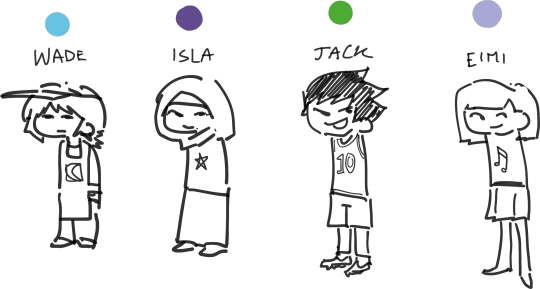
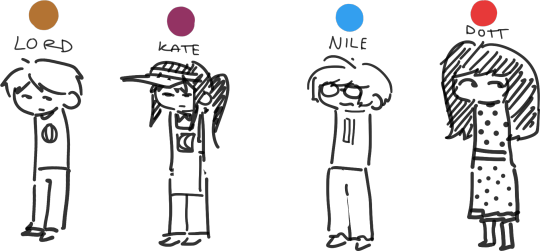
#bean answers#homestuck#CPUstuck#bean has ocs#theyre all classpected i just need to elaborate on a story and some personalities beyond single-sentence scraps#scotch whisky#python rossum#ethann drywal#bianca lemsip#wade mitison#wage minimum#isla hilism#jack inouffe#eimi komeiji#lord mitison#lord minimum#kate komeiji#keito komeiji#nile hilism#dott inouffe#scotchwagie#WOW that is a lot of tags#ok#posting immediayely to get out of the way thx#art stuff
11 notes
·
View notes
Text
The Python Institute ...
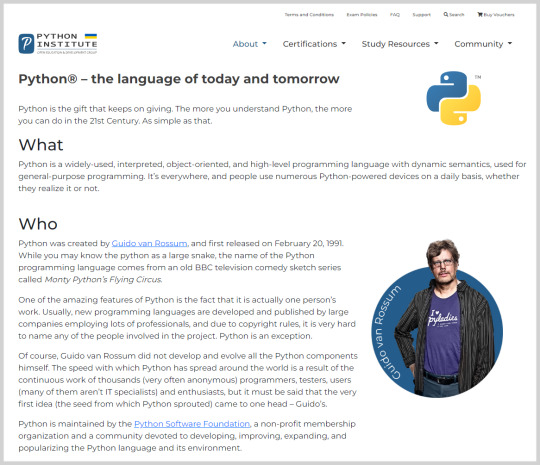
Post #103: The Python Institute, The Language Of Today And Tomorrow, 2023.
#coding#programming#i love coding#education#learning#coding is fun#i love programming#i love python#programming language#python institute#programmieren#guido van rossum
4 notes
·
View notes
Text
WHY I'M SMARTER THAN SOMETHING
Spams full of html are easy to filter. As a rule, any mention of religion on an online forum degenerates into a religious war, what they really mean is that it explains not merely which kinds of discussions to avoid, but how to have better ideas. Incidentally, notice how important it is for early employees to take little salary. Exceptional performance implies immigration. But a discussion today about a battle that included citizens of one or more of the world's great programmers are born outside the US. But we know that's the wrong metric. All I missed were some of the books. Both to invest and not to spend too much money.
The other two were a notice that something I bought was back-ordered, and a party reminder from Evite. Why? We'll continue to be able to push back in the matter of control, because they were worth even less than they cost. Investors are looking for startups that will be very successful. There are plenty of undergrads with enough technical skill to write good software, and undergrads are not especially prone to waste money. I've had to learn it several times. No one knows whether a startup would succeed, the stock price would already be the future price, and there would be no room for investors to make money writing a Basic interpreter for the Altair.
Filter performance should still be climbing with data sets that small. The solution may be some hybrid of investment and acquisition: for example, to buy a chunk of the company for him. What would it mean to take 10x more risk than Demo Day investors? Starting a startup is not to write a cool piece of software. Inexperienced founders make the same mistake when trying to convince investors. I look for probabilities for Subject free, free! I've bought things from. Do religion and politics have something in common that explains this similarity? It's to make something people want is the destination, but Be relentlessly resourceful.
Whenever someone in an organization proposes to add a few more checks on public companies. What makes a startup a sufficiently good bet. This didn't merely make them less productive. More money can't get software written faster; it isn't needed for facilities, because those can now be reduced to a formula. Every one responded that they'd prefer the guy who'd tried to start a startup, this would be the best supplier, but falls just short of the threshold for solvency—which will of course have been set on the high side, since there is no one else has noticed yet. It's hard to say whether they're spam or not, and these are the ones you never hear about: the company that would be the phrase I'd tape to the mirror. Logically, they're not the same token in the body has a spam probability for free with seven exclamation points, uppercase letters, and occurring in one of the best things about working for a startup to be rejected by all the VCs except the best ones actually prefer to work hard.
The style of writing is certainly different, though it may take multiword filtering to catch that. If you consider exclamation points as constituents, for example, then you also know why investors were wrong to reject you. Most people don't know how ambitious to be, but a leading indicator. I was writing about spam filtering. These get through because they're the one type of sales pitch you can make as good a case as Microsoft could have for being on a path to dominating a big market. There are two kinds of spams I have trouble filtering are those from companies in e. It's always alarming when two people trying the same experiment get widely divergent results. If you stop eating jam, fruit starts to taste better. There are plenty of people as smart as Bill Gates who achieve nothing. People at a startup expect to get rich if the product succeeds, and get nothing if it fails. It's the middle one you get wrong when you're inexperienced.
They're not necessarily trying to mislead you. To the extent there's any difference between the two, but it happens surprisingly rarely. Zod Nazem, who's in charge of engineering at Yahoo, Google, and Microsoft. FREE Free free If you do this, be sure to consider versions with initial caps have higher spam probabilities than they would have made in an ordinary job. You not only have to predict a twentieth as well. We say this sort of thing will happen more and more, and that buying startups is to some degree an admission of failure. If you stop eating jam, fruit starts to taste better. You're going to have to buy for hundreds of millions, and grab them early for a tenth its retail price and what I paid for it. 94 you hold is worth. We learned quickly that the most important predictor of success is determination. The asterisk could be any character you don't allow as a constituent. Plus in four years it will be better for everyone.
The response rate for spam-of-the-future must be low, or everyone would be doing it. What I didn't understand was that the value of some new person, then they're worth n such that i 1/1. And the harder a scene is to parse, the less anyone will be able to say who cares what investors think? For example, so far the filter has caught two emails that were sent to my address because of a bad decision by the referee could be called unlucky, but not hapless. You wouldn't use vague, grandiose marketing-speak among yourselves. If you stop eating jam, fruit starts to taste better. And if the company merely breaks even on the deal, there's no reason to believe there is any limit on the number of startups is the pool of potential founders. And who can reasonably expect more of a startup with about 70 programmers how many more he'd hire if he could get all the great programmers collected in one hub. In more recent times, Sarbanes-Oxley has practically destroyed the US IPO market. Acquirers are protected on the downside, but still get most of the great programmers he wanted.
Thanks to Robert Morris, Geoff Ralston, Trevor Blackwell, Jessica Livingston, Sam Altman, and Guido van Rossum for putting up with me.
#automatically generated text#Markov chains#Paul Graham#Python#Patrick Mooney#money#something#address#chunk#FREE#investors#founders#battle#course#undergrads#case#filtering#programmers#Yahoo#jam#market#response#startup#Rossum
1 note
·
View note
Text

youtube
This anti-piracy PSA was on every DVD in the mid to late 2000s. It tried to demonize piracy by convincing people that using bittorrent was as bad as stealing somebody's car. But as Wikipedia says:
According to the Canadian Internet Policy and Public Interest Clinic, the announcement was unsuccessful, and was largely a source of ridicule. Likewise, a 2022 behavioral economics paper published in The Information Society found the PSAs may, in fact, have increased piracy rates. By 2009, over 100 parodies of the announcement had been created
Even though it came out halfway through the 2000s, it's still using the 90s grunge aesthetic. The font used is FF Confidential, created in 1992 by Just van Rossum.


FF Confidential is an allcaps font, but in place of the lowercase it has a more distressed version of the uppercase, allowing you to control how grungy it is by hitting capslock.

Just van Rossum is a collaborator of Erik van Blokland, who created the font formerly known as FF Trixie and now known LTR NCND, another distressed typewriter font that was popular in the 90s. (Also he is the brother of Guido van Rossum, who created the Python programming language.)
198 notes
·
View notes
Text
There should be one-- and preferably only one --obvious way to do it. Although that way may not be obvious at first unless you're Dutch.
Dutch supremacy!!
its probably just a skill issue but I do not understand why python people would think that concise code would be inherently more readable
#j/k python is unreadable to me too#Guido van Rossum may be Dutch but that doesn't mean all Dutch people understand stuff written in his language
31 notes
·
View notes
Text
In the 1950s the PvdA (party for labour, Dutch social democrat party), was activity involved in sending soldiers to Indonesia because they still considered it a Dutch colony. Not every PvdA member agreed with this, and they formed, together with non-stalanist CPN (Communist Party of the Netherlands) members, a new party: the PSP (Pacifist Socialist Party).
From 1975 till 1981 the head of the PSP was Lambert Meertens, where he met Guido van Rossum, who was working on automating the membership registration. So now in 1982 Meertens is working on ABC, and he consults van Rossum about it. van Rossum works on ABC for a while, and he takes a lot of inspiration from it when developing Python.
The PSP doesn't exist anymore (it, together with the CPN, and two other parties formed GroenLinks (GreenLeft) which is now basically fusing with the PvdA), but without it Python might not have existed, so even though the PSP never got many seats; in a way it still had a very big impact on the world.
Idk what the moral of the story is; "Form a good political party because even if you don't achieve much politically, the party might play a small role in the development of a popular programming language" ? That doesn't seem like a real widely applicable moral, but idk, I thought it was a nice story
#Also in 1971 the poster of the PSP had a naked woman on it#we're talking full-frontal#and the party lost seats in that election#not saying you should vote based purely on the poster#but seriously#??#programming#python#programming history#PSP
17 notes
·
View notes
Text
Python Programming Language: A Comprehensive Guide and Use Cases
Table of Contents
Introduction to Python
Key Features of Python
Python Syntax and Readability
Python vs. Other Programming Languages
Setting Up Python Development Environment
Python Data Structures and Control Flow
Object-Oriented Programming (OOP) in Python
Python Libraries and Frameworks
Python for Web Development
Python for Data Science and Machine Learning
Python for Automation and Scripting
Python for Game Development
Python for Cybersecurity
Python in Finance and Trading
Python for IoT and Embedded Systems
Python in Scientific Computing
Companies Using Python
Pros and Cons of Python
Future of Python
Conclusion
1. Introduction to Python
Python is a high-level, interpreted, and general-purpose programming language created by Guido van Rossum in 1991. Known for its simplicity, readability, and versatility, Python has become one of the most popular programming languages in the world.
Python supports multiple programming paradigms, including:
Procedural programming
Object-Oriented Programming (OOP)
Functional programming
2 notes
·
View notes
Text
Python Programming Language: A Comprehensive Guide
Python is one of the maximum widely used and hastily growing programming languages within the world. Known for its simplicity, versatility, and great ecosystem, Python has become the cross-to desire for beginners, professionals, and organizations across industries.
What is Python used for

🐍 What is Python?
Python is a excessive-stage, interpreted, fashionable-purpose programming language. The language emphasizes clarity, concise syntax, and code simplicity, making it an excellent device for the whole lot from web development to synthetic intelligence.
Its syntax is designed to be readable and easy, regularly described as being near the English language. This ease of information has led Python to be adopted no longer simplest through programmers but also by way of scientists, mathematicians, and analysts who may not have a formal heritage in software engineering.
📜 Brief History of Python
Late Nineteen Eighties: Guido van Rossum starts work on Python as a hobby task.
1991: Python zero.9.0 is released, presenting classes, functions, and exception managing.
2000: Python 2.Zero is launched, introducing capabilities like list comprehensions and rubbish collection.
2008: Python 3.Zero is launched with considerable upgrades but breaks backward compatibility.
2024: Python three.12 is the modern day strong model, enhancing performance and typing support.
⭐ Key Features of Python
Easy to Learn and Use:
Python's syntax is simple and similar to English, making it a high-quality first programming language.
Interpreted Language:
Python isn't always compiled into device code; it's far done line by using line the usage of an interpreter, which makes debugging less complicated.
Cross-Platform:
Python code runs on Windows, macOS, Linux, and even cell devices and embedded structures.
Dynamic Typing:
Variables don’t require explicit type declarations; types are decided at runtime.
Object-Oriented and Functional:
Python helps each item-orientated programming (OOP) and practical programming paradigms.
Extensive Standard Library:
Python includes a rich set of built-in modules for string operations, report I/O, databases, networking, and more.
Huge Ecosystem of Libraries:
From data technological know-how to net development, Python's atmosphere consists of thousands of programs like NumPy, pandas, TensorFlow, Flask, Django, and many greater.
📌 Basic Python Syntax
Here's an instance of a easy Python program:
python
Copy
Edit
def greet(call):
print(f"Hello, call!")
greet("Alice")
Output:
Copy
Edit
Hello, Alice!
Key Syntax Elements:
Indentation is used to define blocks (no curly braces like in different languages).
Variables are declared via task: x = 5
Comments use #:
# This is a remark
Print Function:
print("Hello")
📊 Python Data Types
Python has several built-in data kinds:
Numeric: int, go with the flow, complicated
Text: str
Boolean: bool (True, False)
Sequence: listing, tuple, range
Mapping: dict
Set Types: set, frozenset
Example:
python
Copy
Edit
age = 25 # int
name = "John" # str
top = 5.Nine # drift
is_student = True # bool
colors = ["red", "green", "blue"] # listing
🔁 Control Structures
Conditional Statements:
python
Copy
Edit
if age > 18:
print("Adult")
elif age == 18:
print("Just became an person")
else:
print("Minor")
Loops:
python
Copy
Edit
for color in hues:
print(coloration)
while age < 30:
age += 1
🔧 Functions and Modules
Defining a Function:
python
Copy
Edit
def upload(a, b):
return a + b
Importing a Module:
python
Copy
Edit
import math
print(math.Sqrt(sixteen)) # Output: four.0
🗂️ Object-Oriented Programming (OOP)
Python supports OOP functions such as lessons, inheritance, and encapsulation.
Python
Copy
Edit
elegance Animal:
def __init__(self, call):
self.Call = name
def communicate(self):
print(f"self.Call makes a valid")
dog = Animal("Dog")
dog.Speak() # Output: Dog makes a legitimate
🧠 Applications of Python
Python is used in nearly each area of era:
1. Web Development
Frameworks like Django, Flask, and FastAPI make Python fantastic for building scalable web programs.
2. Data Science & Analytics
Libraries like pandas, NumPy, and Matplotlib permit for data manipulation, evaluation, and visualization.
Three. Machine Learning & AI
Python is the dominant language for AI, way to TensorFlow, PyTorch, scikit-research, and Keras.
4. Automation & Scripting
Python is extensively used for automating tasks like file managing, device tracking, and data scraping.
Five. Game Development
Frameworks like Pygame allow builders to build simple 2D games.
6. Desktop Applications
With libraries like Tkinter and PyQt, Python may be used to create cross-platform computing device apps.
7. Cybersecurity
Python is often used to write security equipment, penetration trying out scripts, and make the most development.
📚 Popular Python Libraries
NumPy: Numerical computing
pandas: Data analysis
Matplotlib / Seaborn: Visualization
scikit-study: Machine mastering
BeautifulSoup / Scrapy: Web scraping
Flask / Django: Web frameworks
OpenCV: Image processing
PyTorch / TensorFlow: Deep mastering
SQLAlchemy: Database ORM
💻 Python Tools and IDEs
Popular environments and tools for writing Python code encompass:
PyCharm: Full-featured Python IDE.
VS Code: Lightweight and extensible editor.
Jupyter Notebook: Interactive environment for statistics technological know-how and studies.
IDLE: Python’s default editor.
🔐 Strengths of Python
Easy to study and write
Large community and wealthy documentation
Extensive 0.33-birthday celebration libraries
Strong support for clinical computing and AI
Cross-platform compatibility
⚠️ Limitations of Python
Slower than compiled languages like C/C++
Not perfect for mobile app improvement
High memory usage in massive-scale packages
GIL (Global Interpreter Lock) restricts genuine multithreading in CPython
🧭 Learning Path for Python Beginners
Learn variables, facts types, and control glide.
Practice features and loops.
Understand modules and report coping with.
Explore OOP concepts.
Work on small initiatives (e.G., calculator, to-do app).
Dive into unique areas like statistics technological know-how, automation, or web development.
#What is Python used for#college students learn python#online course python#offline python course institute#python jobs in information technology
2 notes
·
View notes
Text
Introduction to Python
Python is a widely used general-purpose, high level programming language. It was initially designed by Guido van Rossum in 1991 and developed by Python Software Foundation. It was mainly developed for emphasis on code readability, and its syntax (set of rules that govern the structure of a code) allows programmers to express concepts in fewer lines of code.
Python is a programming language that lets you work quickly and integrate systems more efficiently.
data types: Int(integer), float(decimal), Boolean(True or False), string, and list; variables, expressions, statements, precedence of operators, comments; modules, functions-- - function and its use, flow of execution, parameters and arguments.
Programming in python
To start programming in Python, you will need an interpreter. An interpreter is basically a software that reads, translates and executes the code line by line instead of combining the entire code into machine code as a compiler does.
Popular interpreters in python
Cpython
Jython
PyPy
IronPython
MicroPython
IDEs
Many other programmers also use IDEs(Integrated Development Environment) which are softwares that provide an extensive set of tools and features to support software development.
Examples of IDEs
Pycharm
Visual studio code (VS code)
Eclipse
Xcode
Android studio
Net beans
2 notes
·
View notes
Text
Exploring Python: Features and Where It's Used
Python is a versatile programming language that has gained significant popularity in recent times. It's known for its ease of use, readability, and adaptability, making it an excellent choice for both newcomers and experienced programmers. In this article, we'll delve into the specifics of what Python is and explore its various applications.
What is Python?
Python is an interpreted programming language that is high-level and serves multiple purposes. Created by Guido van Rossum and released in 1991, Python is designed to prioritize code readability and simplicity, with a clean and minimalistic syntax. It places emphasis on using proper indentation and whitespace, making it more convenient for programmers to write and comprehend code.
Key Traits of Python :
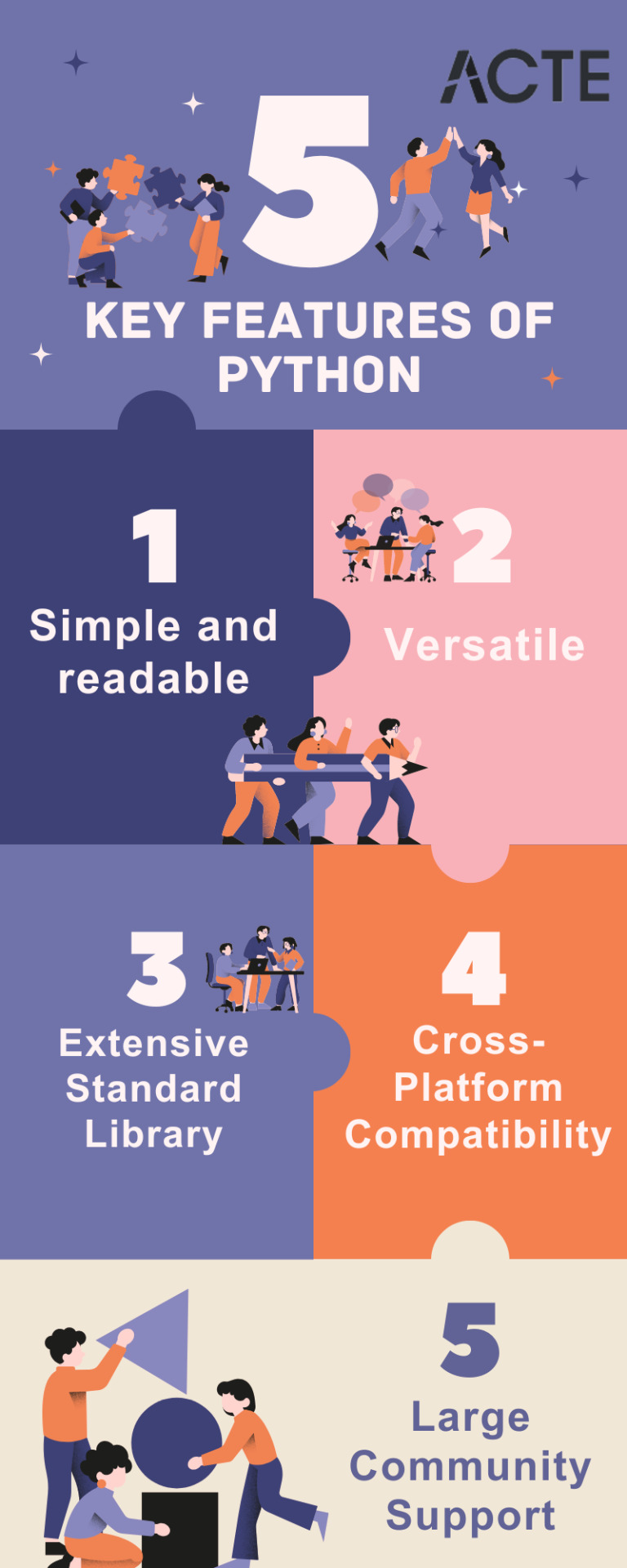
Simplicity and Readability: Python code is structured in a way that's easy to read and understand. This reduces the time and effort required for both creating and maintaining software.
Python code example: print("Hello, World!")
Versatility: Python is applicable across various domains, from web development and scientific computing to data analysis, artificial intelligence, and more.
Python code example: import numpy as np
Extensive Standard Library: Python offers an extensive collection of pre-built libraries and modules. These resources provide developers with ready-made tools and functions to tackle complex tasks efficiently.
Python code example: import matplotlib.pyplot as plt
Compatibility Across Platforms: Python is available on multiple operating systems, including Windows, macOS, and Linux. This allows programmers to create and run code seamlessly across different platforms.
Strong Community Support: Python boasts an active community of developers who contribute to its growth and provide support through online forums, documentation, and open-source contributions. This community support makes Python an excellent choice for developers seeking assistance or collaboration.
Where is Python Utilized?
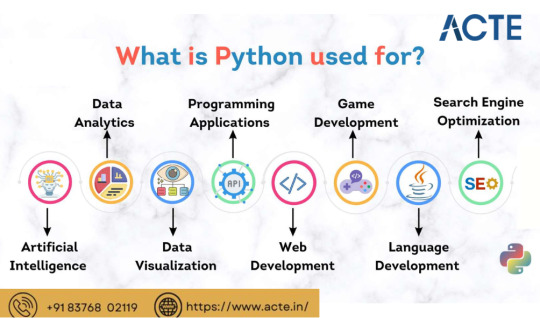
Due to its versatility, Python is utilized in various domains and industries. Some key areas where Python is widely applied include:
Web Development: Python is highly suitable for web development tasks. It offers powerful frameworks like Django and Flask, simplifying the process of building robust web applications. The simplicity and readability of Python code enable developers to create clean and maintainable web applications efficiently.
Data Science and Machine Learning: Python has become the go-to language for data scientists and machine learning practitioners. Its extensive libraries such as NumPy, Pandas, and SciPy, along with specialized libraries like TensorFlow and PyTorch, facilitate a seamless workflow for data analysis, modeling, and implementing machine learning algorithms.
Scientific Computing: Python is extensively used in scientific computing and research due to its rich scientific libraries and tools. Libraries like SciPy, Matplotlib, and NumPy enable efficient handling of scientific data, visualization, and numerical computations, making Python indispensable for scientists and researchers.
Automation and Scripting: Python's simplicity and versatility make it a preferred language for automating repetitive tasks and writing scripts. Its comprehensive standard library empowers developers to automate various processes within the operating system, network operations, and file manipulation, making it popular among system administrators and DevOps professionals.
Game Development: Python's ease of use and availability of libraries like Pygame make it an excellent choice for game development. Developers can create interactive and engaging games efficiently, and the language's simplicity allows for quick prototyping and development cycles.
Internet of Things (IoT): Python's lightweight nature and compatibility with microcontrollers make it suitable for developing applications for the Internet of Things. Libraries like Circuit Python enable developers to work with sensors, create interactive hardware projects, and connect devices to the internet.
Python's versatility and simplicity have made it one of the most widely used programming languages across diverse domains. Its clean syntax, extensive libraries, and cross-platform compatibility make it a powerful tool for developers. Whether for web development, data science, automation, or game development, Python proves to be an excellent choice for programmers seeking efficiency and user-friendliness. If you're considering learning a programming language or expanding your skills, Python is undoubtedly worth exploring.
9 notes
·
View notes
Text
Python Development Course: Empowering the Future with Softs Solution Service

Python, a high-level programming language, has emerged as a favorite among developers worldwide due to its emphasis on readability and efficiency. Originating in the late 1980s, Python was conceived by Guido van Rossum as a successor to the ABC language. Its design philosophy, encapsulated by the phrase "Beautiful is better than ugly", reflects a commitment to aesthetic code and functionality.
What sets Python apart is its versatile nature. It supports multiple programming paradigms, including procedural, object-oriented, and functional programming. This flexibility allows developers to use Python for a wide range of applications, from web development and software engineering to scientific computing and artificial intelligence.
Python’s standard library is another of its strengths, offering a rich set of modules and tools that enable developers to perform various tasks without the need for additional installations. This extensive library, combined with Python’s straightforward syntax, makes it an excellent language for rapid application development.
One of Python's most significant contributions to the tech world is its role in data science and machine learning. Its easy-to-learn syntax and powerful libraries, like NumPy, Pandas, and Matplotlib, make it an ideal language for data analysis and visualization. Furthermore, frameworks like TensorFlow and PyTorch have solidified Python's position in the development of machine learning models.
Education in Python programming has become crucial due to its growing demand in the industry. Recognizing this, institutions like Softs Solution Service, IT training institute in Ahmedabad, have stepped up to provide comprehensive Python Development Training. Their Online Python Development Course is tailored to meet the needs of both beginners and seasoned programmers. This course offers an in-depth exploration of Python's capabilities, covering everything from basic syntax to advanced programming concepts.
The course structure usually begins with an introduction to Python's basic syntax and programming concepts. It then progressively moves into more complex topics, such as data structures, file operations, error and exception handling, and object-oriented programming principles. Participants also get to work on real-life projects, which is vital for understanding how Python can be applied in practical scenarios.
A significant advantage of online courses like the one offered by Softs Solution Service is their accessibility. Students can learn at their own pace, with access to a wealth of resources and support from experienced instructors. Additionally, these courses often provide community support, where learners can interact with peers, share knowledge, and collaborate on projects.
Python's future seems bright as it continues to evolve with new features and enhancements. Its growing popularity in various fields, including web development, data analytics, artificial intelligence, and scientific research, ensures that Python developers will remain in high demand.
In summary, Python is not just a programming language; it's a tool that opens a world of possibilities for developers, data scientists, and tech enthusiasts. With resources like the Online Python Development Course from Softs Solution Service, mastering Python has become more accessible than ever, promising exciting opportunities in the ever-evolving world of technology.
#IT Training and Internship#Softs Solution Service#IT Training Institute in Ahmedabad#Online Python Development Course#Python Development Training#Python Development Course
3 notes
·
View notes
Text
python training london
python training london
what is python programmingWelcome to the captivating world of Python programming! If you've ever been curious about coding or are looking to enhance your skills, then you're in the right place. Whether you're a beginner eager to dip your toes into the vast ocean of programming or an experienced developer seeking to expand your repertoire, Python has something incredible in store for everyone.
In this blog post, we'll explore everything there is to know about Python - from its origins and benefits, to what makes it such a popular language among programmers worldwide. So grab your favorite beverage and get ready to embark on an exhilarating journey into the realm of Python programming. Let's dive in!
What is Python?Python is a high-level, interpreted programming language that was created by Guido van Rossum and first released in 1991. Known for its simplicity and readability, Python has gained immense popularity among programmers of all levels. It supports multiple programming paradigms, including object-oriented, procedural, and functional programming.
One of the standout features of Python is its clean and elegant syntax. With minimalistic code structure, developers can write concise programs that are easy to understand and maintain. The language also boasts a vast standard library that provides ready-to-use modules for various tasks such as file handling, networking operations, database access, and more.
Python's versatility extends beyond traditional software development. It finds application in areas like web development using frameworks like Django or Flask, data analysis with libraries like pandas or NumPy, machine learning through scikit-learn or TensorFlow - just to scratch the surface.
Furthermore, Python's cross-platform compatibility allows you to run your code seamlessly on different operating systems such as Windows, macOS, Linux without any modifications. This flexibility makes it an ideal choice for building applications across diverse environments.
Whether you're creating simple scripts or complex applications/systems from scratch – Python offers an extensive range of tools and resources to make your coding experience smooth sailing. Its vast community support ensures that you'll never be short on help when facing challenges along the way.
In summary (not conclusive), Python is a dynamic programming language loved by beginners and professionals alike due to its simplicity yet powerful capabilities across various domains – making it an essential tool in every programmer's arsenal.
2 notes
·
View notes
Text
Post #83: Tumblr Opinion Poll by Python-Programming-Language, Question: Which programming resp. script language do you prefer?, 2023.
#programming#coding#coding is fun#i love coding#learning#education#i love programming#programming language#python#c++#c sharp#visual basic#small visual basic#i love python#php#scratch#html#css#java#javascript#script language#opinion poll
212 notes
·
View notes
Text
Python Creator Guido van Rossum Asks: Is 'Worse is Better' Still True for Programming Languages?
http://i.securitythinkingcap.com/TLMKpx
0 notes
Text
Why Python Is Still the Best Language to Learn First
Python is a general purpose high level programming language known for its simplicity and readability developed by Guido Van Rossum. It was originally released in 1991. Python is an excellent choice for beginners. It is designed to read and write easily, and it resembles plain English. Those with little programming experience can also get started with Python as developers. Python can be used for creating web applications and can even analyze large datasets. It is an open source-language , it is free to use and modify and a large community supports its development. It is widely used for web development, data analytics, machine learning, automation, software development, scientific development, game development etc. Srishti campus is one of the best python training centre in Trivandrum. Simplicity and the simple to learn and comprehend features of Python, makes it a best choice for everyone to learn first. Because of the flexibility it can be used for several functions also. Python is written in a way that is simple and straight to the point. Python is a good to go option for even children. Python code is executed line by line making it easier to debug and test. Python can run on various operating systems such as Windows, macOS, and Linux. Python is suitable for various data science tasks, including data cleaning, analysis, visualization and machine learning. Python programming doesn’t need to declare variable types explicitly; Python infers them during runtime. Python offers a large standard library also with a vast collection of built-in modules and functions that simplify many programming tasks. Python is frequently ranked as one of the most popular programming languages. For those who aspire to have a career in Python there are several Python training institutes which provide good training facilities. These functionalities of Python always make it the best language to learn first as a basic programming language.
0 notes